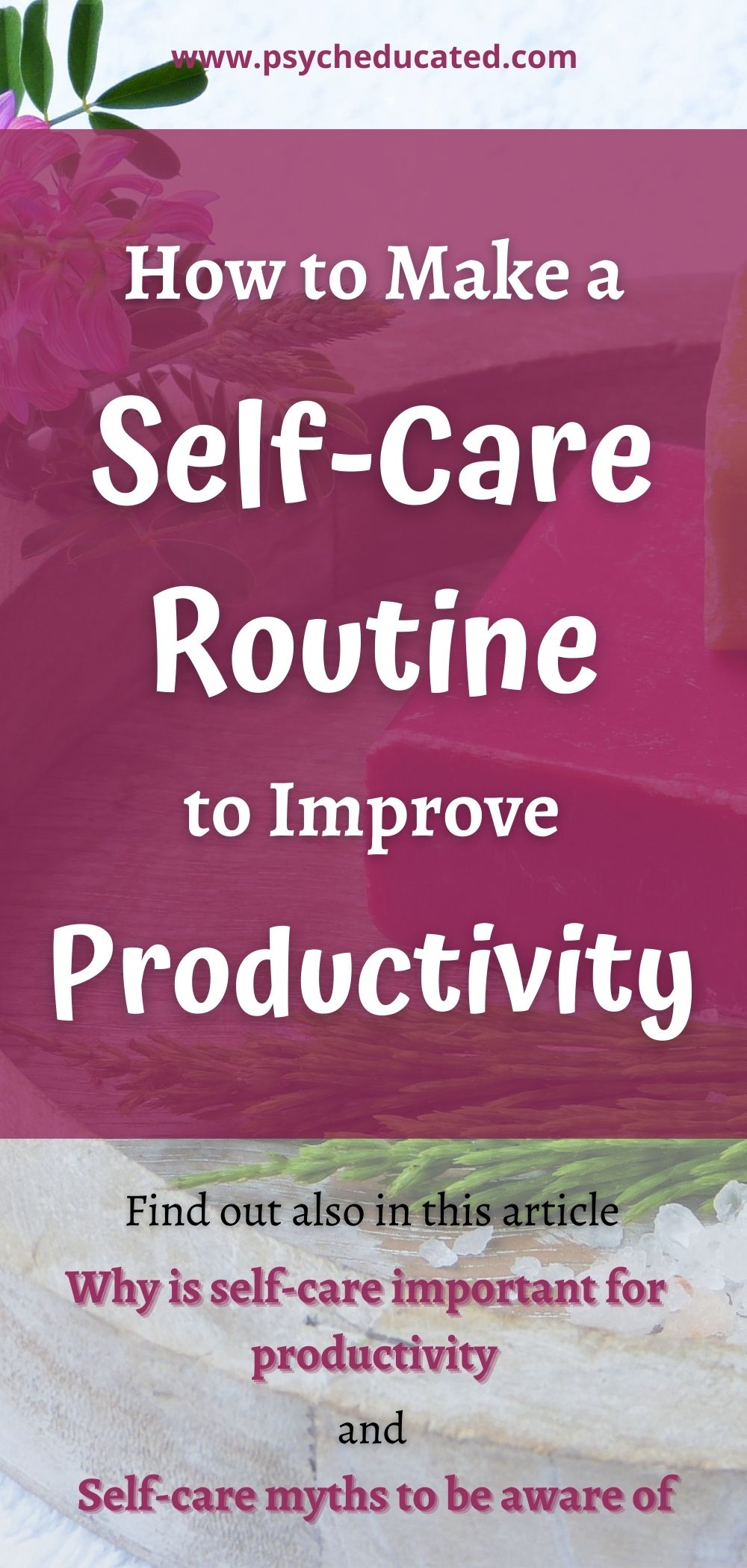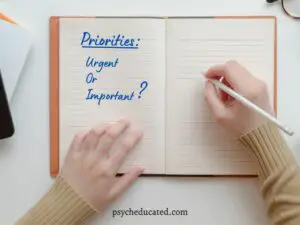Find us on:
How to Make a Self-Care Routine to Improve Productivity

It is incredibly important to take care of your well-being and your mental health while trying to get productive, and one of the easiest ways to do that is by making self-care routine part of your daily life.
By practicing small acts of self-care each day, you’ll be more prepared to take on the world around you, as well as giving yourself the chance to recharge after stressful situations or difficult times at work or at home.
In this article, we’re going to see how you can develop your own self-care routine and improve productivity at the same time!
Why is self-care important for productivity?
When you are overly concerned with being productive, you can become trapped in a work spiral, unable to find a way out, which can lead to burnout and mental health issues.
But when you put yourself before work by developing a consistent self-care routine, you will not only have better mental health and thus be a happier person, but you will also be able to boost your productivity levels.
Yes! You heard it right! When you make yourself a priority and install a self-care routine, this will significantly increase your productivity.
People who look after themselves have better cognitive abilities so are able to concentrate and focus better, meaning they produce more and are more effective.
Dr. Russell Thackeray
Most of us don’t realize how much mental health can affect work performance and success in business. Overlooking mental health can lead to many negative consequences, such as burnout, lost time, and lower quality output.
If you don’t take time out for yourself or create a self-care routine, you might be making it harder for yourself to reach your potential and perform at your best on a daily basis.
Here is a post where I present 13 easy habits to increase productivity.
Let’s start first by defining self-care

Can you think of something that you can do to make yourself happy and relaxed while also benefiting your body and spirit? Well, that’s self-care!
We can define self-care as that deliberate action that you choose to take on a regular basis to take care of your physical and mental well-being.
Self-care isn’t just a buzzword, it’s necessary for maintaining mental health and well-being in an increasingly stressful world.
People who want to be healthy must first understand the aspects that can affect their health, such as physical effort, diet, sleep quality, stress levels, and mental wellness. This list should be created by each individual depending on their own particular requirements.
Beware of self-care myths
There are so many myths about self-care that can discourage you from incorporating this practice into your daily routine, so beware of those. Here are some examples:
Self-care is a selfish act
Taking care of yourself does not imply neglecting others. The first thing does not automatically induce the second.
Unfortunately, many of us go through days at a time feeling overwhelmed by our duties and in need of some stress relief, but we are afraid to take time for ourselves for fear of coming across as selfish.
Self-care isn’t selfish if it’s done for your own health and well-being! You aren’t taking care of yourself because it is good for others. You do it because it is good for you.
Remember: You can never be of use to anyone else if you don’t take care of yourself first.
Self-care is an indulgence
Self-care isn’t just pampering yourself with spa treatments and bubble baths; it’s taking care of your emotional and physical needs by putting yourself first. Self-care is about feeding your mind and body what they need to stay healthy.
A good self-care routine isn’t just about making yourself feel good, it’s also about being your best, most productive self in all aspects of life. When you put your health first, you’re setting yourself up for better performance on every level, and that includes work.
The way we treat ourselves directly impacts our ability to handle stress (or not) and recover from setbacks. So, in order to perform at your best in stressful situations, you need to take care of yourself.
Self-care is a one-time experience
Self-care is something you do on a daily basis and not once a year. According to a study conducted on students, those who incorporate self-care into their daily routine report less stress and a higher quality of life.
One of the most popular ways people include self-care in their lives is by taking time out of each day to pamper themselves. For example, taking regular baths or meditating for 5 minutes every morning can have powerful effects on both your physical and mental health.
When building an effective self-care routine it’s important to remember that you should pick things that will enhance your life as well as relax you, so experiment with different activities and go with what works best for you!
Self-care is time-consuming
Taking time for yourself does not have to take up your entire day. A lot of people try to convince themselves that they don’t have time for self-care because it would mean taking even more time away from their already overloaded schedules.
This is why many people turn down offers for lunch dates or refuse to see friends or family members who live near them; simply put, they feel guilty about spending any time on themselves.
However, as long as you know what you really need to say no to (like saying no at work when someone asks you to stay late) and use that time to take care of yourself, then you can still be productive while also making yourself a priority in your own life.
Never Feel Guilty about Considering Self-Care
Our lives have become more and more occupied. Work and family obligations tend to demand most of our attention, leaving little time for me time.
But our health and well-being are important too, and feeling guilty about neglecting ourselves doesn’t make it any easier to carve out some personal time.
So why not get ahead of those feelings by making your own happiness a priority right now?
If you’ve struggled with guilt over not prioritizing your needs, consider these two techniques:
1) creating an automatic habit that makes your self-care easier (like going for walk after dinner or exercising first thing in the morning),
2) working on being more mindful in general so you’re better able to tune in to how you’re feeling.
The Most Important Things to Consider in Your Self-Care Routine to Increase Productivity

Ask yourself what you really need: There are hundreds of different ways you can care for yourself; what’s most important is that you choose something that feels fulfilling and non-destructive.
Every day, look at your schedule and decide what time of day and at what point in your schedule you’re most likely to feel drained. That’s when you should focus on caring for yourself.
Here are some things that you must consider when creating a self-care routine that will benefit your productivity.
Start with a solid self-care Morning routine
If you want your day to go smoothly, it’s important that you start it out right. A good morning routine will give you time for yourself, leave you feeling ready for whatever tasks lie ahead, and help you avoid burnout.
There are several important components to creating an effective morning routine. The first thing that you want to do is get yourself out of bed on time, and not just for your morning routine. Getting up and getting ready early sets you up for success all day.
If you don’t have much time in your mornings before work or school, figure out what’s important so that you can still prioritize taking care of yourself even if you have less time than you like.
Things like meditation and journaling can be done very quickly in just minutes, so they are perfect additions to your morning.
Understand Your Strengths and Weaknesses
You can’t strengthen a muscle you don’t know exists, so before you start creating your self-care routine, you need to know what exactly needs strengthening.
By reflecting on your weaknesses and strengths, it’s easier to see where you need work and how much effort each step of your routine should take.
To do so, consider questions like: What does success look like for me? How important is achieving my goal in relation to my other goals and priorities? Do I want everyone else around me—at home or at work—to understand what I’m doing or will it be okay if they only notice positive results after some time has passed?
Make time for self-care
Make time for self-care on your calendar or treat it like any other appointment you have.
Your mental health is as important as anything else, and if you don’t schedule it, you’ll likely forget about it.
That’s fine in some cases — if you genuinely didn’t have time for your hobby last weekend because of work, for example — but when there are too many just because excuses floating around, it can be detrimental.
Use rituals
Rituals are powerful self-care tools that are proven to create positive habits and reduce anxiety.
We tend to be creatures of habit, and we form many of our daily routines out of long-established habits. As such, you can harness rituals as a way to create new habits that will leave you feeling fulfilled, more productive, and happier.
The key is turning your new morning ritual into something that feels automatic, something so intuitive it just happens.
If you start trying new things in an effort to liven up your day but stop yourself from doing them because they don’t feel like second nature yet, then chances are you’ll never get in a groove with those new routines.
If you want to learn how to create rituals, write them down or at least think about what they might be. Something as simple as giving yourself a 5-minute break after each meal will help you relax after eating.
Make your routines soothing and relaxing by turning on music, lighting candles or incense, or bathing in a bubble bath. Your ritual doesn’t need to be complicated; it just needs to fit your personality and style.
Prioritize Mental Health
It is much easier said than done, but in order to feel your best and be your best, you must prioritize mental health. And with so many responsibilities on our plates these days, it can feel impossible.
But believe me, there are ways to take care of yourself without losing focus or cutting corners at work. In fact, in most cases, I’d argue that taking care of yourself improves your performance at work.
So how do you balance it all? Start by making sure you’re getting enough sleep (7+ hours), start setting boundaries, and recognize when you need help from someone else.
Plus, it’s already scientifically proven: Studies have shown that people who incorporate self-care have less depression and anxiety. So, by practicing self-care, you will be taking care of your mental health.
Practice positive self-talk
When we feel down, our negative thoughts can quickly spiral out of control. To break them, it’s important to recognize these thoughts and replace them with more positive ones. This is called cognitive restructuring or cognitive reframing.
The key is to start thinking about how your situation could be perceived in a more positive light.
For example, if you catch yourself saying I never have time for anything anymore! or I can’t believe how hard work is! replace these thoughts with something more positive and constructive.
It might feel strange at first but it will help retrain your mind and body for positivity and wellness.
When you have such negative thoughts about yourself or your future, stop and think:
What are some positive things I can say about myself right now?
Are there any ways my future could be better than I realize?
It might take some time for new positivity to sink in, but in time your outlook will change.
Stay realistic
You should eat healthily, go to bed early, and exercise every day. Sure, those are all good things, but it’s not always realistic. Take into account your work schedule and what other activities you have going on in your life (work meetings or child care) before laying out a plan for self-care.
Setting too many goals for yourself can make you feel overwhelmed. So focus on making one change at a time instead of trying to do everything at once. If taking 10 minutes every morning is as much as you can handle right now, that’s okay—it’s better than nothing!
Take away
In the end, I want to say that self-care IS important for your productivity. Yes, you can work as hard as you want, but if you don’t nurture yourself along the way, it will catch up with you at some point.
And that catch-up comes in many forms: low energy and motivation, low moods and feelings of overwhelm, poor quality of work…all things that keep us from being productive. So take time for yourself!
Never feel guilty for taking care of yourself! Self-care is not selfish, it’s not an indulgence. it won’t take much of your time and it can only be good for you if you practice it every day.
To install a solid self-care routine that will boost your productivity all day long you need to start caring for yourself first thing in the morning. Try to implement rituals to make the habits stuck. Know yourself, say positive things to yourself, and prioritize your mental health. Make time for me time every day but make sure to stay realistic.
If you incorporate small gestures of self-care in your everyday life you’ll see a certain increase in your overall physical, mental, emotional, spiritual health, and productivity.
In the next article, we are going to talk about the self-care habits of the most productive people.
What do you think about self-care? Do you implement it in your routine? Does it help your productivity?
Share your thoughts with us in the comments section!
Pin me!






Thanks for your blog, nice to read. Do not stop.